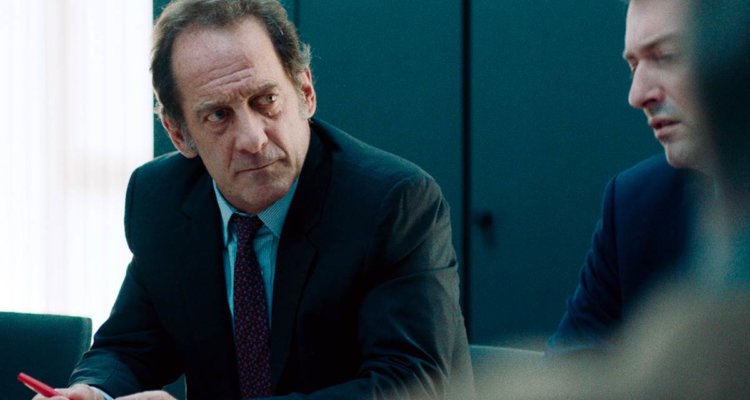Stéphane Brizé’s “Another World” could make for a worthy conclusion to an unofficial trilogy on contemporary economic relations, following the French filmmaker’s recent efforts “The Measure of a Man” and “At War.” Each work deploys the empathy machine of cinema to demonstrate the brokenness of a system powered by a dehumanizing focus on profits over all else, albeit leveling that critique from a different vantage point at each step along the way. Taken individually, each is undoubtedly impressive and stands on its own. Yet when analyzed as a triptych, the mastery of Brizé as both artist and thinker emerges.
READ MORE: Venice Film Festival 2021 Preview: 12 Must-See Films To Watch
All three films make expert use of actor Vincent Lindon at their center, requiring him to slip into three entirely different positions on the economic ladder with naturalistic ease. Following turns as a downcast laborer and fiery union organizer, “Another World” casts Lindon as industrial middle manager Philippe Lemesle. As a functionary of false consciousness, Philippe must maintain strong relations with the plant workers and union officers while also placating the big bosses in France and across the pond in the United States. He navigates the razor’s edge nimbly but struggles mightily when it comes to his latest task from on high: determining a plan for downsizing operations while the company remains profitable.
READ MORE: Fall 2021 Movie Preview: 60+ Must-See Films
If that’s not enough, Philippe must also deal with another set of negotiations on the home front. His wife and the mother of his two children, Sandrine Kiberlain’s Anne, has filed for divorce. The two try to separate amicably, even despite the enmity stemming from Anne’s thwarted career ambitions, by keeping things as matter of fact as possible in the proceedings. But even as they try to separate legally, they keep finding themselves unable to disentangle emotionally.
READ MORE: The Best Films Of 2021, So Far
Everything may be economics, Brizé maintains in “Another World,” but nothing is ever so cut and dry when human emotions enter the equation. Market forces are anything but dispassionate and rational – they’ve just been classified as such by a class of people who are insulated from feeling the full pain of their effects. There’s not so much bitterness in the film as there is sadness, both in the divorce and the downsizing. Philippe, a superman among the everyman set, tries to swim upstream and discharge his duties while also hanging onto tenderness for other people.
READ MORE: Summer 2021 Preview: Over 50 Movies To Watch
It’s a bold thematic gamble for Brizé to intertwine the personal and the professional in such an abstract way, especially given that social realist dramas usually opt for straightforwardness in both storytelling and style. The domestic scenes in “Another World” shared between Philippe and Anne as they grasp at the dying shards of tenderness still connecting them might feel like a distraction in the narrative. But they’re both context and complement to Philippe’s business dealings in ways that slowly build surprising momentum. They reinforce his guiding light: people are bound by forces stronger than money.
READ MORE: The 100 Most Anticipated Films Of 2021
That’s not to suggest that the family life scenes are spotless. Scenes featuring Philippe and Anne’s troubled son enduring personal difficulties drop like a random bomb midway through the film. These are rare moments in “Another World” that feel like they put themes before people as the scenes largely function to make Philippe listen to statements he knows are fully unmoored from fact. In other words, not all that different from what he must do at work to cut costs and personnel despite financial gains. But the fact that Brizé attempts something audacious within the form rather than going for a de facto naturalism makes the film immensely more exciting than the average economic drama.
At times, this unconventional, a bit unwieldy, hybrid is easily Brizé’s most complex and accomplished of the bunch. His more choreographed camerawork and the swelling operatic score seem to announce as much, too. If “Another World” is not as visually striking as the sparse stillness of “The Measure of a Man” or the jittery urgency of “At War,” the intricacies of the storytelling structure more than compensate. Even when it dips into a bit of didacticism at the close, this is not a film for those who want their politics spat back at them. This meditation on the emotions that bind and the economy that separates is a worthy representation of the risky business of holding onto humanity in contemporary society. [B+]
Follow along with our full coverage from the 2021 Venice Film Festival here.

